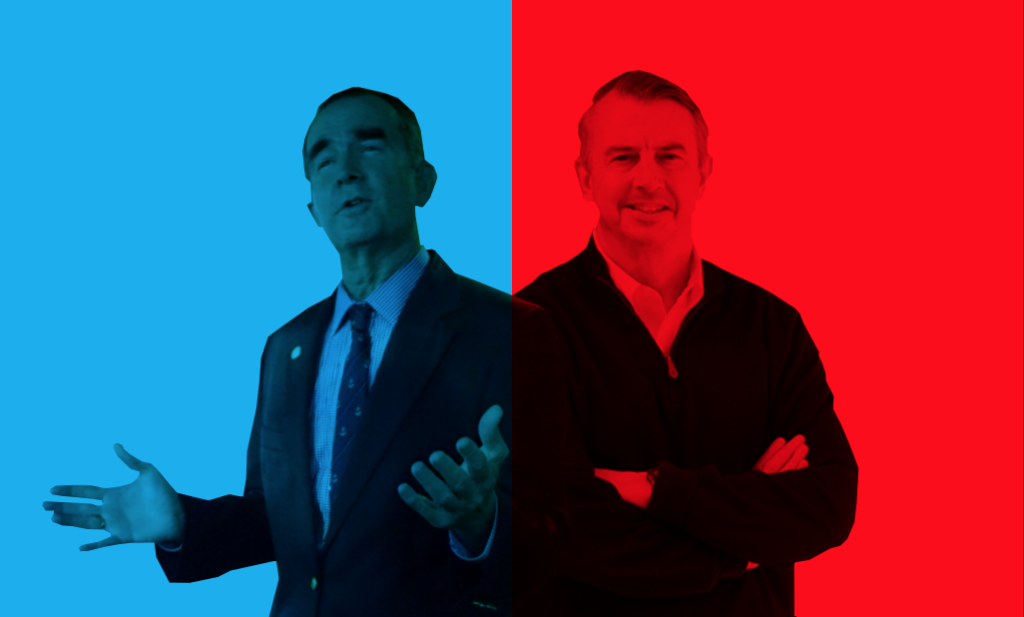Ralph Northam beat Ed Gillespie. And that’s all that really matters as a tumultuous 2017 comes to a close.
Prevailing in a brutal nationally-watched statewide — where “survivor” is a more apt characterization than “winner” — is a major achievement; incredibly challenging to body and state of mind. So hats off.
And without intending to take anything away from team Northam, the old saw that “it’s better to be lucky than good” is operative in his case.
In short, Northam was lucky Trump is President.
In the final analysis, Gillespie couldn’t have won this off-year race no matter what type of campaign he ran — he was swamped by a Dem turnout tsunami. One impetus for this piece was hearing repeatedly that Gillespie “ran a better Senate campaign” against Mark Warner.
Not applicable.
Sure, the Northam folks can say they skillfully harnessed the avalanche of anti-Trump sentiment with a brilliant turnout effort and sophisticated, targeted messaging.
But the reality is that Northam stumbled repeatedly: offering a confusing mixed message about working with Trump; fumbling his Civil War monument positioning; flip-flopping under pressure on the MS-13 gang issue in the campaign’s final days, among others. The campaign was almost always wobbly and off-balance.
Northam’s most glaring deficiency was an ineffectual, reactive TV ad effort. His positive ads were “vanilla” (rightly observed one Democratic consultant when Northam appeared in trouble the final week), and his attack ads against Gillespie were formulaic in message, and rote in terms of production.
Northam’s “Enron Ed” spot, in particular, revealed a weak grasp of contemporary cultural and political touchstones; the spot had the generic feeling of an early 2000’s anti-Bush DNC ad.
Under a barrage of well done Gillespie attack ads on multiple fronts — crime issues salient in the suburbs, especially— Northam was sinking in quicksand in the end game.
Or so I thought.
In the last week of the campaign, I felt vindicated in my opinion Northam faced imminent defeat when Democratic media consultant, Carter Eskew, published his Washington Post piece, “Can Ralph Northam Hold Off Ed Gillespie’s Surge in Virginia.”
Eskew, one of the ‘best of the best’ ad and message guys in the business says in his first sentence: “If the Democrats’ strategy for winning the governor’s race in Virginia is to convince people that Ralph Northam can lose, they are doing a really good job. I am worried they are right.”
He goes on to point out, “Based on the dozens of ads I saw this weekend (unlike many viewers, I actually pay close attention to them), Gillespie has a clear strategy and messaging to support it…
“Meanwhile, Northam seems stalled with less than a week to go. Based on his ads, his strategy seems defensive and soft. In one ad, he finally responds to Gillespie’s charges that he is weak on crime, which is a fine example of the political rebuttal genre, but not where you want to be at this point in a campaign.”
Of course, Eskew’s opinion at the time represented the race atmospherics as it unfolded on TV, and in our daily digital ad consumption.
Underneath it all — where that key variable called “reality” rules — Gillespie was about to be buried.
On election day, Gillespie received more votes than any GOP candidate for governor in Virginia history, received more votes than Terry McAuliffe, and more votes than the last GOP governor, Bob McDonnell, who won his race by double-digits.
And even in the so-called Trump 2016 “surge” counties, Gillespie outperformed Trump.
Gillespie’s problem? Northam also outpolled Hillary Clinton in her 2016 surge jurisdictions — with hers being vastly more populous: Loudon, Fairfax, Arlington, Alexandria and Prince William.
So the notion still advanced in some circles that if only Gillespie had embraced Trump more closely, he would have prevailed, isn’t a serious proposition.
The numbers don’t, and wouldn’t, add up.
And for the GOP, that’s the scariest thing about what was then ostensibly a Lean Dem/Tossup VA Govs race: a campaign run as poorly as Northam’s can win by a comfortable margin in major metro areas where anti-Trump sentiment animates a host of angry Democratic base constituencies.
That’s just the way its going to be.
Even with an improving economy and the wildcard it offers the GOP, any potential electoral benefit should only be viewed as a partial offset to a more powerful turnout motivator, anger, now working in Democrats’ favor.
At the end of the day, Northam’s campaign basically “just showed up” — and still won. That’s cause for concern.

